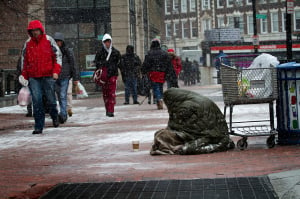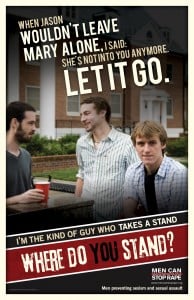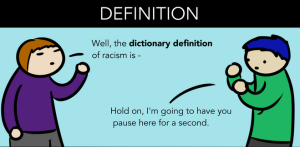
A person stares into the camera with one hand resting against their neck. They have a serious expression.
Originally published on FoodFatnessFitness and republished here with their permission.
It is a contradiction to work for social justice and perpetuate fatphobia at the same time. This should be obvious, and yet many people with strong commitments to social justice often use rhetoric that entrenches the oppression of fat people.
A popular, but pernicious, set of fatphobic assertions takes the form of what some scholars refer to as the “foodscape argument.” On its surface, the foodscape argument (which is also known as the “obesogenic environment” thesis, or the “environmental” theory of fatness) seems progressive. The theory postulates that western industrial societies are experiencing an “epidemic” of “obesity,” which is driven in large part by economic inequality.
According to the foodscape argument, low-income people lack access to nutritious foods and are therefore forced to consume an “unhealthy” diet, which causes them to become too fat.
Certainly, it is true that many people live in food deserts (neighborhoods in which food choices are severely restricted), and this injustice urgently needs to be rectified. But the foodscape argument is not the emancipatory theory that it seems to be; as we shall see, it reinforces fatphobia, along with many other interlinked forms of oppression.
Here are some reasons why.
1. ‘Fat’ Does Not Equal ‘Unhealthy’
The fact that a person is fat indicates nothing about their state of health or the kinds of foods that they eat.
Daily, we receive anti-fat messages from the media and medical establishment, but these are based on extremely sketchy science: mostly, studies funded by the weight loss industry. Only at the far ends of the body-size spectrum (very thin or very fat) is weight at all predictive of health or longevity; and even these small differences are likely attributable to social and medical bias against fat people.
Historically, fat people have been refused medical insurance, and when they do visit healthcare providers, they are frequently denied necessary tests and treatments, as whatever symptoms they report are often blamed on their size.
In other words, it is fatphobia, not fatness, that poses a major public health danger. The foodscape argument exacerbates this problem by intensifying fears about “the obesity epidemic.”
2. The Foodscape Argument Has Ableist and Healthist Implications
People with chronic illnesses and disabilities routinely confront the social assumption that our conditions must be the result of errors we have made, most likely in regard to diet. “Have you tried eating more greens? Maybe you should cut out gluten,” we are advised.
The foodscape argument reinforces this ableist and healthist way of thinking by eliding the myriad other factors that affect health and ability.
Pollution, unsafe working conditions, violence, social stigma, poverty, overwork, sleep deprivation, substandard housing, and lack of access to adequate medical care all imperil the health of people who are economically oppressed.
And because fat people face pervasive socioeconomic discrimination, they experience a greater concentration of these health threats than thin people do.
3. The Foodscape Theory Upholds the Neoliberal Value of ‘Personal Responsibility’
Although it seems to critique the ideal of personal responsibility – by arguing that poor people can’t help being fat because poverty and food deserts impede access to high-quality foods – the foodscape argument has the effect of authorizing a condescending and paternalistic attitude toward people who are fat, poor, or both.
After all, plenty of poor people are thin, and many middle-class and wealthy folks are fat. If, as the foodscape argument maintains, fat is “unhealthy” and body size is primarily determined by what one eats, does this mean that the many poor people who are thin are making better “choices” than fat people in similar economic circumstances?
And as for middle- and upper-class fat people who can afford “healthy foods”– implicitly, the foodscape argument suggests that these individuals must be making bad dietary choices.
4. What Are Healthy Foods, Anyway?
Grounded in the belief that fatness results from eating “unhealthy” foods, the foodscape argument assumes that there is consensus about what foods promote health. In reality, the “experts” can’t even agree on the basics.
Consider carbohydrates, for example. Everyone knows that carbs are bad, right? And, by contrast, we all agree that whole grains are good? Well, yes – except that whole grains are carbohydrates! Depending on the label it’s given, the same food (say, a piece of whole wheat bread) is portrayed by one nutritional camp as villainous (“All those carbs!”) and by another as the essence of dietary virtue (“Healthy whole grains!”).
Ditto with fats: everyone is trying to eat “less fat” – except for followers of programs like the Paleo diet, which posit that eating more fat is the path to health.
If authorities can’t agree on what constitutes a “healthy” diet, then the foodscape argument’s contention that “unhealthy” foods are causing a crisis of excessive fatness clearly lacks coherence.
5. The Foodscape Argument Comes with a Heavy Helping of Class Bias
Think of how often the word “McDonald’s” is used as shorthand for “those fattening foods that poor people eat.” The foodscape argument equates fast food with bad food in part because cheeseburgers and French fries are assumed to make people fat.
Okay, but how come when economically privileged people enjoy expensive versions of the same menu items (such as grass-fed burgers topped with “artisanal” cheese, and accompanied by sides of organic fries), these high-end meals are frequently lauded (for example, in middle-class foodie culture in the US) as examples of “healthy eating”?
This class-based double standard suggests that the foodscape argument, although it may appear to be politically progressive, actually enacts a classist disciplining of poor and working-class people.
6. The Foodscape Theory Reinforces Racism
A popular articulation of the foodscape argument proposes that distinct dietary preferences among people of color have enabled the food industry to manipulate nonwhite people into eating too much.
In Sugar Salt Fat, a bestselling book that promotes the foodscape theory, Michael Moss uncritically reiterates racist and infantilizing assertions made by food industry “experts” who claim that “kids and African Americans” are “particularly keen” on “salty and sweet” foods.
Castigating convenience stores that cater to the alleged “sweet tooth of minorities,” Moss compares these stores to “drug dens” during the “crack epidemic.”
Losing sight of the obvious (it should be clear that it’s a stretch to compare soda and potato chips to crack), some thin white advocates of the foodscape argument act as would-be missionaries who imagine that they need to “help” fat people of color make appropriate dietary choices.
7. Xenophobia Plays a Prominent Role in the Foodscape Argument
We’re in the midst of an ugly election season in the US, which kicked off with Donald Trump’s egregious characterization of immigrants from Mexico as “criminals” and “rapists.”
Xenophobia, which unfortunately is commonplace on the political right, also animates some versions of the progressive-sounding foodscape argument, as when the allegedly “unhealthy” eating habits of Latino/as are singled out for critique.
For example, Greg Critser (another bestselling popularizer of the foodscape argument) makes fun of “urban caballeros, drywalleros, and jardineros” whom he describes as participating in a “supersize bacchanal” at McDonald’s and thus contributing to a supposed “epidemic” of “obesity.”
8. Fatphobia Buttresses Ageism
If you have lived long enough to experience “aging” – or if you have simply looked around at the variety of body types that exist in the world – you have probably noticed this: as people get older, they tend to get fatter.
That’s why, when we say that someone has kept their “youthful figure,” we mean that this person has managed to stay thin.
Thus, the mandate to create a thinness-promoting foodscape may inadvertently support an ageist agenda that – upholding the interests of the sellers of hair dyes, Botox, and cosmetic surgeries – contributes to a social world in which youth is assumed to always be better than age.
9. The Foodscape Argument Is Inseparable from Sexism
Michael Pollan (yet another bestselling author who promotes the foodscape theory) frequently expresses nostalgia for a putatively better, more wholesome era, in which women reveled in the pleasures of preparing homecooked meals from scratch.
According to Pollan, “some American feminists thoughtlessly trampled” this traditional feminine wisdom “in their rush to get women out of the kitchen.”
In fact, feminist activists have fought less to “get women out of the kitchen” than to provide us with the same variety of choices to which men have access – including not cooking, if we happen not to enjoy it.
10. The Foodscape Argument Obscures the Serious Problem of Food Poverty
The incorrect assumption that fatness results from “overeating” makes it difficult to recognize that in wealthy capitalist countries millions of people, fat and thin, are going hungry. (As I have explained elsewhere, it is indeed possible to be both hungry and fat.)
At the same time that well-intentioned progressives are employing the foodscape argument to conjure up images of poor people getting sick from eating too much, public health experts are warning that a rise in food poverty in the UK has “all the signs of a public health emergency,” while in Spain children have been “fainting in school due to lack of proper meals,” and in the US 14% of households are food insecure.
By perpetuating the misconception that “overeating” is the primary health threat that poor people face, the foodscape argument lends ammunition to conservative commentators, who have advocated cutting food stamps in order to reduce “obesity” among poor people.
***
After reflecting upon the above concerns, some progressive readers may be tempted to ask: what if we keep the foodscape argument but eliminate its politically problematic aspects?
This is impossible, because the foodscape argument – which is premised on the notion that an entire group, fat people, is fundamentally not okay – is incompatible with progressive political ideals.
Contending that fatness is caused by economic injustice, the foodscape argument imagines that an equitable world would be free of fatness and fat people. By contrast, a truly emancipatory approach to body diversity must work for a world that is free of fatphobia.
[do_widget id=’text-101′]
Anna Mollow is a disability studies and fat studies scholar, writer, and activist. She is the co-editor, with Robert McRuer, of Sex and Disability (2012) and the co-editor, with Merri Lisa Johnson, of DSM-CRIP (2013), a special issue of Social Text Online. Anna has published numerous articles on disability, queerness, feminism, race, and fatness. Her essays have appeared in Bitch Magazine, Huffington Post, Autostraddle, FoodFatnessFitness, WSQ: Women’s Studies Quarterly, The Journal of Literary and Cultural Disability Studies, the Disability Studies Reader, and more. Anna lives in Sonoma County, California with her wife, the disability and fat justice activist Jane Arlene Herman.
Search our 3000+ articles!
Read our articles about:
Our online racial justice training
Used by hundreds of universities, non-profits, and businesses.
Click to learn more




















